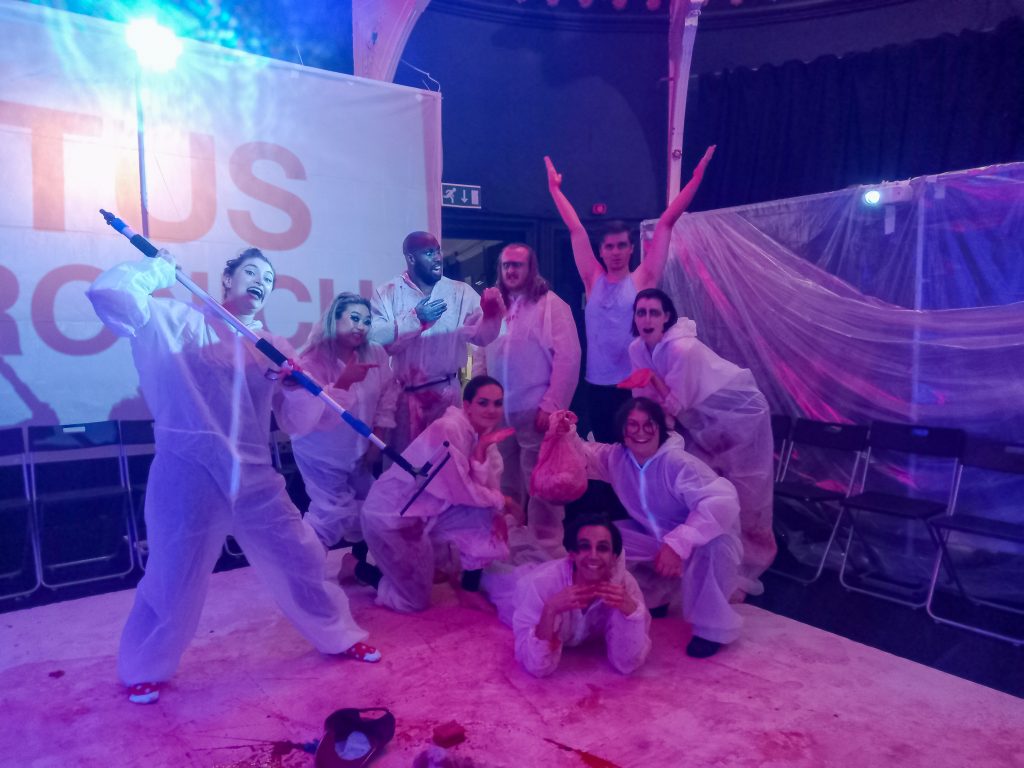
Above the pub in the King’s Arms sits director Abey Bradbury in a white disposable coverall checking in audience members and offering free ponchos, which they heavily suggest taking, along with the option of ear plugs. Inside the theatre is a minimalistic set of pure white foam floor tiles and three projectors and screens, along with 36 chairs around the sides of the room.
Music plays over the speakers as guests enter and get comfortable for an hour-and-a-half of pure blood and gore. It’s not a full house, but it’s busy for a Monday night.
The music quietens along with the audience, as names of characters flash on screen and quotes are read aloud, overlapping each other. It almost feels overwhelming but before it gets too much the play begins with the words “Titus Andronicus”.
The cast is only seven, and yet feels as if it is made of more. With some members playing two characters, such as Saturnius/Demetrius and Bassianus/Chiron, played by Laura Crow and Matthew Khan respectively. This is not an easy task and yet both actors make it seem as though these characters are played by four separate people. Khan manages to make a distinct difference from the strong Bassianus, to the more anxious Chiron. While Crow shows the versatility of playing a Roman Emperor, commanding the room and their subjects, to the lust-driven and violent Demetrius.
This version of the 400-year-old play brings it up to date with British Sign Language being incorporated into the show, as well as certain storylines and characters being taken out. This includes the original villain Aaron, whose acts are performed by Tamora. Instead this version focuses on the main storyline of Titus and Tamora’s revenge, making it much more streamlined and also easier to understand.
Each member of the cast is outstanding both with how they work with each other and on their own. Those who stood out included Devane Boyd who played the titular role. He really conveyed the pain and anguish Titus goes through, perfectly capturing the descent into madness and genuinely quite scary at times. Boyd makes it so you cannot help but feel sorrow for Titus Andronicus, despite the atrocities that he commits in the first scene. The ability to turn around a character from being someone to be hated for his bloodlust to someone who should be pitied for his loss is not easily done.
Duncan Riches’ portrayal of Lavinia also needs highlighting – portraying a demure, scared presence onstage in the first act, to an abused and disfigured presence in act two. And eventually becoming the scheming, violent and revengeful mute character from the fourth act. Lavinia spends most of the show as someone who has been mentally and physically scarred and Riches portrays that with delicacy.
The fact Lavinia has few lines before and after her tongue is removed might make it harder for some actors to really make their presence seen onstage. Being such a vital role in the demise of every other character is a lot of pressure, however Riches delivers a memorable performance.

The direction of this play by Abey Bradbury and assistant director Arisha-Jane Marsh deserves praise for its staging, costumes (or lack thereof) and the set, allowing horror scenes to be shown with compassion and sensitivity via creative captioning. For instance, during Lavinia’s assault scene, we do not hear the screams and bones breaking – we see them and read them while Tamora stands on the stage sinking to the ground.
Sometimes I found the creative captioning to be a little distracting but it is necessary to strive for accessibility within theatre and Shakespeare, so I wouldn’t remove it.
The lack of costumes and set also adds to the show, as the pure white coveralls being stained red over time really shows the impact of the decisions of each character. It also serves to show just how much blood is shed during the 90 minute, two litres in each show is really obvious on the actors and floor.
Titus Andronicus is a show perfect for both Shakespeare lovers and those who do not like Shakespeare but want to experience a new take on live theatre. Although not for everyone with the themes of violence and assault, it is one to watch if you want something creative, suspenseful and most of all different.
Titus runs until this Friday, with tickets being on sale here.














Recent Comments